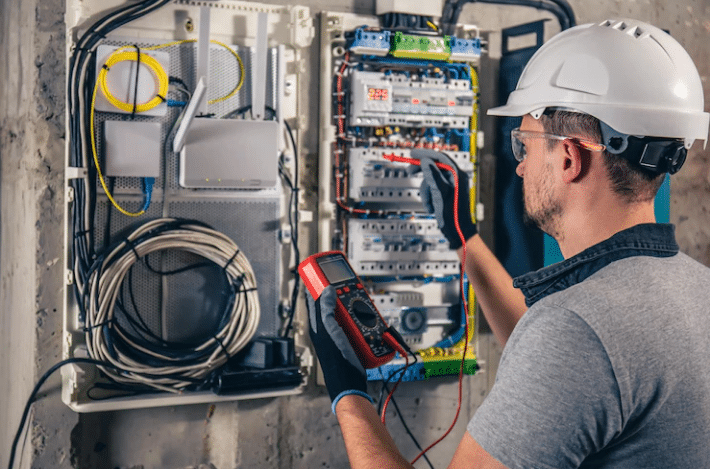Master electricians offer the best work and service possible in the electrical industry. Master electricians are crucial in the electrical industry because they train other electricians and manage large projects, in addition to running their businesses and supervising other electricians. You can decide if becoming a master electrician is the right career choice for you by being aware of the duties and qualifications involved.
In this article, we go over how to become a master electrician, what a master electrician makes on average, and what the job outlook is.
What Is A Master Electrician?
A master electrician is a professional who has the highest level of licensure in the electrical field and is qualified to perform electrical work, draft blueprints for electrical systems, and direct teams working on electrical systems. Furthermore, they rank above both journeymen and apprentices, who can work independently for a business and, if they so choose, advance to become master electricians. States in the US have different requirements for becoming master electricians.
Note that to become an electrician, it typically takes seven years of apprenticeship under a master electrician, during which you must pass several tests.
Duties And Responsibilities Of A Master Electrician
Here are the duties and responsibilities that a master electrician is likely to perform in their role.
- Remove, analyze, and identify issues before properly installing working pressure transducers, allowing priorities to proceed.
- PLC experience, for example, in industrial maintenance.
- Installation and maintenance experience with motors, welding equipment, lighting fixtures, generators, circuit breakers, and transformers.
- Snake wires through PVC, conduits, and walls.
- Work under company safety policies and maintain OSHA-compliant facilities.
- Fix the transformer, substation breaker, and other equipment failures.
- Uphold OSHA, MSDS, and cleanroom protocol standards.
- Adjust and repair electrical and control equipment related to HVAC, including variable frequency drivers, on a regular and emergency basis.
- Adhere to local and NEC regulations while performing electrical work in a safe and timely manner.
- Control electrical installations for PLCs, thermal, pressure, flow control, GPU, and RTU structures.
- Obtain in-depth practical experience working with high voltage systems and facility systems, such as HVAC, chillers, and boilers.
- Ensure that all required electrical materials are installed properly following NEC and U.S. government regulations.
- Install transformers as well as medium voltage splices and terminations in underground electrical distribution systems.
- Work on advanced paint line plumbing, vibratory conveyor systems, tempering ovens, and pneumatic brake presses.
- Check and replace the fluids in gearboxes, and lubricate and grease drives and bearings.
Qualifications and Requirements to Become a Master Electrician
Before practicing independently, electricians typically need formal education, practical experience, and an apprenticeship. Additionally, most states mandate that electricians continue their education throughout their careers to stay current on safety regulations and building codes.
Furthermore, make sure an electrician has the following credentials before hiring them:
#1. Vocational Training:
A master electrician must have a degree from a technical college or vocational school that specializes in training electricians is a good start.
#2. Relevant Experience:
A master electrician should have worked on projects that are equivalent to or the same as the one you need them for, and they should be more knowledgeable in the fields you care about.
#3. Required Permits:
A master electrician must have updated permits or licenses that are required in your state before they can be hired.
#4. Positive Reviews:
You can learn more about how locals feel about an electrician’s work by reading the many positive reviews they have received from homeowners.
#5. Personal Liability Insurance
Master electricians are supposed to have personal liability insurance to safeguard them from financial loss.
#6. Workers’ Compensation
Master electricians must have policies that can help them in the event of an injury, as required by states.
Different Levels in an Electrical Career
#1. Apprentice:
With a high school diploma or GED, aspirant electricians can apply for an apprenticeship with a licensed electrician to gain their first work experience. Note that the initial step in becoming an electrician is completing an apprenticeship.
#2. Journey-Level:
Journey-level electricians are licensed to work in all specialty electrical categories as well as in commercial and industrial settings. Electrical contractors must complete countless training hours under a journey-level electrician to obtain this certification. Furthermore, the precise figure varies from state to state, but generally speaking, it’s around 8,000 hours.
#3. Master:
Master electricians are the most experienced electricians and hold the highest level of electrical certification. Typically, journey-level electricians can advance to master after accumulating 4,000 hours of experience, which is equal to two years of full-time work.
Additionally, in some states, master electrician candidates must also pass a test. A qualified and seasoned worker will be on the job if you hire a master electrician.
Importance Of A Master Electrician
#1. They guarantee safety:
Safety concerns are among the most vital justifications for hiring a master electrician. Note that electricity should only be handled by qualified individuals due to its strength and potential danger. A master electrician is qualified and experienced to handle electricity safely.
#2. They get the Job Done Right:
Secondly, employing a master electrician is also recommended because they will complete the task correctly. A bad electrical project can be costly to fix in addition to being dangerous. Note that you can relax knowing that the job will be done correctly the first time when you hire a master electrician.
#3. A Master Electrician saves time and money:
Long-term, working with a master electrician can save you time and money. Electrical projects can be difficult, and if they are carried out incorrectly, they may result in additional damage that will be costly to fix. Additionally, you can avoid costly errors and ultimately save time and money by working with a professional.
#4. Peace of Mind:
You’ll feel more at ease knowing that your electrical project is in capable hands if you hire a master electrician. Therefore, you can feel secure knowing that your project is being handled by a qualified and experienced professional because master electricians are licensed and insured.
#5. They do the job quickly
It’s likely that if you attempt to complete an electrical project on your own, it will take you longer than it would. Master electricians not only have the expertise required to complete the task quickly, but they also have access to resources and tools that the majority of homeowners do not. Therefore, this implies that if you hire a professional, your electrical project will be finished quickly.
What Is the Best Way to Become an Electrician?
How much education you need is one of the first things to think about if you want to become a master electrician. We have discovered that bachelor’s degrees are held by only 28% of master electricians. In terms of higher education, we discovered that master electricians make up 16.2% of the workforce. Therefore, while some master electricians hold a college degree, becoming one is still possible with only a high school diploma or GED.
How Long Does It Take to Become a Master Electrician?
You must have held a general journey-level electrician certification from L&I for at least four years in order to be eligible to take the master electrician exam. Additionally, you must have held an L&I specialty certification for at least two years in order to be eligible to take the exam.
What Is the Highest Pay for a Master Electrician?
Master electricians can earn anywhere between $45,000 and $68,000 annually. Master electricians make up about 30% of the workforce. Additionally, electrical systems, electrical equipment, and switches are the three areas in which master electricians are most frequently skilled. Note that women make up 6% of master electricians, but men make up 94%.
Is a Journeyman Better Than a Master Electrician?
No. a journeyman is not better than a master electrician. It takes three to six years and 8,000 hours of training to become a journeyman. You work as a master electrician’s apprentice during this time, learning the fundamentals of electrical work from him. Therefore, in order to learn at the journeyman level, you frequently complete tasks or jobs that a journeyman might be required to do.
Additionally, you must work as a journeyman electrician for at least one year before you can complete the additional training to become a master electrician. A master electrician must complete 4,000 hours of supervised training over two years in addition to the journeyman’s training requirements. You gain knowledge in areas like developing electrical blueprints and solving challenging electrical problems during this training.
What is the Highest Paying Electrician Job?
#1. Electrical Superintendent
Salary range: $62,000-$98,000 per year
As an electrical superintendent, you supervise the planning and installation of an electrical system in new or existing construction. Furthermore, you help plan and design electrical systems, hire subcontractors, and manage the installation process. Additionally, you oversee testing to ensure safety.
#2. Electrical Systems Designer
Salary range: $66,000-$92,000 per year
Currently, the average annual salary for Electrical Systems Designers in the United States is between $66,000 and $92,000. Although it is open to changes, the average range of salaries for this position will be consistent regardless of location, and years of experience. Additionally, there is a large demand for electrical system designers in the American job market.
#3. Certified Electrician
Salary range: $50,000-$70,000 per year
In the United States, the majority of Certified Electrician salaries currently fall between $50,000 and $70,000 per year. The average salaries of this position look to remain consistent regardless of skill level and location. Additionally, the Certified Electrician job market in the United States is moderately active, with several companies hiring.
How Do I Become a Master Electrician in Massachusetts?
You must continue your education if you want to become a master electrician. You must have worked as a journeyman electrician for at least a year before you can become a master electrician. Note that community colleges, and technical schools all offer these courses.
Afterward, a journeyman license must be held for at least one year before applying for a master electrician license. You must also have completed an additional 150 hours of electrical code-related classroom instruction.
How Much Does an Electrician Journeyman Make in Massachusetts?
The average annual salary for a journeyman electrician in Massachusetts is $63,000. If you need a quick salary estimator, that comes out to be about $30 per hour.
What Is the Average Age of a Licensed Journeyman Electrician in Massachusetts?
In Massachusetts, the average age of an employed licensed journeyman electrician is typically 40 years old. White (65%) is the most prevalent racial group among electricians with a license, followed by Hispanic (19%), Black or African American (9.0%), and Unknown (4.3%). In Tewksbury, Massachusetts, licensed electricians are in demand.
How to Find a Master Electrician Near Me?
Ask around for recommendations and compare multiple electricians before hiring. Secondly, read reviews, check credentials, and ask the right questions to take out those who aren’t up for the job.
HVAC CERTIFICATION: Step-To-Step Guide to Get HVAC Certified
ELECTRICIAN: What Electricians Do, How Much They Make & How to Become One
ELECTRIC VEHICLES COMPANIES: Top Companies & Stocks to Invest in
ELECTRICIAN SCHOOL: Best Electrician Schools in 2023 & How Much It Cost







1 comment
A solar panel course will open up various career opportunities for you. You could work in business development, project management, purchasing, technical leadership, and sales coordination positions.